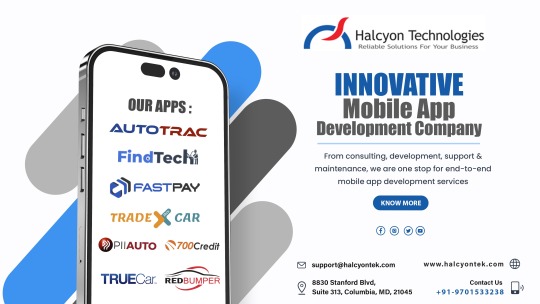#Cross Platform Mobile Development
Explore tagged Tumblr posts
Text
0 notes
Text
Navigating The Mobile Application Development Landscape:Technologies Selection Strategies

In the realm of Mobile app development, choosing the right programming language is akin to selecting the perfect tool for crafting a masterpiece. With the proliferation of smartphones, tablets, and computers, the demand for innovative and user-friendly applications has skyrocketed. Mobile, a leading player in the app development industry, understands the significance of selecting the best programming language to ensure the success of their projects. In this article, we delve into the intricacies of Mobile app development and explore the key factors involved in selecting the optimal programming language.
Understanding Mobile App Development
Mobile stands out in the competitive landscape of Mobile app development with its commitment to delivering cutting-edge solutions tailored to meet the diverse needs of clients. Whether it's developing mobile apps for iOS, Android, or cross-platform compatibility, Mobile's expertise shines through in every project they undertake. Central to their success is their adeptness at selecting the most suitable programming language for each app development endeavor.
Factors Influencing Language Selection
* Nature of the App: The type and complexity of the Mobile application play a pivotal role in determining the programming language best suited for the project. For instance, if the app requires real-time processing and high-performance capabilities, languages like Swift for iOS or Kotlin for Android are preferred choices.
* Target Platform: Understanding the platform for which the app is being developed is crucial. Mobile ensures compatibility and optimal performance by choosing languages that align with the respective platforms' guidelines and standards. This includes considering factors such as API support, performance optimization, and user experience.
* Team Expertise: Leveraging the skills and expertise of the development team is essential in language selection. Mobiloitte's proficient developers are well-versed in a plethora of programming languages, enabling them to make informed decisions based on project requirements and team capabilities.
* Community Support and Resources: Opting for languages with robust community support and extensive resources enhances the development process. Mobile prioritizes languages like Python, Java, and JavaScript, which boast vibrant developer communities, ample documentation, and a vast array of libraries and frameworks.
Best Programming Languages for Mobiloitte App Development
*Swift: Ideal for developing high-performance iOS apps, Swift offers modern syntax, safety features, and seamless integration with Apple's ecosystem, making it a preferred choice for Mobiloitte's iOS development projects.
*Kotlin: With its concise syntax, null safety, and interoperability with Java, Kotlin has emerged as the go-to language for Android app development at Mobile . Its versatility and robust features streamline the development process, resulting in feature-rich and scalable Android applications.
* Python: Renowned for its simplicity and versatility, Python is a favorite among Mobile app developers for backend development, data analysis, and machine learning projects. Its extensive libraries and frameworks accelerate development while ensuring code readability and maintainability.
* JavaScript: As the cornerstone of web development, JavaScript is indispensable in Mobiloitte's repertoire. Whether it's building interactive web applications or hybrid mobile apps using frameworks like React Native, JavaScript empowers Mobiloitte to deliver immersive user experiences across diverse platforms.
Conclusion
In the dynamic landscape of app development, selecting the best programming language is a critical determinant of success. Mobiloitte, as a leading mobile application development services and decentralized app development provider, strategically chooses programming languages tailored to each project's needs, ensuring optimal outcomes for native app development services, hybrid app development services, Android app development, iOS mobile app development, and cross-platform mobile development. With expertise spanning across mobile game development, AR/VR app development, and wearable app development, Mobiloitte leverages the power of cutting-edge technologies and community support to deliver innovative solutions that resonate with clients and users alike.
#mobile application development services#mobile app development company#decentralized app development#native app development services#hybrid app development services#android app development#ios mobile app development#cross platform mobile development#mobile game development company#ar/vr app development#wearable app development#mobile apps development
0 notes
Text
Mobiloitte South Africa: Elevating Mobile Game Development Services Mobiloitte, at the forefront of Mobile Game Development in South Africa. Merging captivating graphics with riveting gameplay, we create games that resonate with the South African spirit. Using cutting-edge tools and platforms, our games intrigue, entertain, and engage. Dive into a world where local narratives meet global appeal. With Mobiloitte, entertainment elevates.

#mobile application development services#mobile app development company#decentralized app development#native app development services#hybrid app development services#android app development#ios mobile app development#cross platform mobile development#mobile game development company#ar/vr app development#mobile apps development#mobile game development services#android mobile game development#mobile game apps development
0 notes
Text
Mobile App Development Services in Singapore - Mobiloitte
Mobiloitte, a Singapore mobile app development company, specializes in mobile application development services. Our expertise spans decentralized, native, and hybrid app development, delivering tailored solutions to meet your needs. With a focus on Android app development, we ensure cutting-edge functionality, seamless user experiences, and top-tier security. Trust Mobiloitte to drive your mobile app success story.
#mobile application development services#mobile app development company#decentralized app development#native app development services#hybrid app development services#android app development#ios mobile app development#cross platform mobile development#mobile game development company#ar/vr app development
0 notes
Text
https://starvikstudio.com/cross-platform-app-development-frameworks/
Discover the top 10 cross-platform app development frameworks for 2023 that allow you to build high-quality mobile applications for multiple.
#mobile app development company#mobile application development#cross platform app development#cross platform mobile development#top mobile app development companies#react native app development company#android app development company
0 notes
Text
Streamline Your Development with Cross Platform App Development
Discover the efficiency of cross-platform app development, where developers create mobile applications for multiple platforms like iOS and Android using a single codebase. By leveraging cross-platform frameworks, the need for writing unique code for each platform is eliminated, enabling seamless deployment across all platforms. Explore the world of cross-platform development to optimize your mobile app creation process.
#cross platform app development#cross platform mobile development#cross platform mobile app development
0 notes
Text
Halcyon technologies -best mobile app development company in USA
Halcyon technologies is the best mobile app development company in USA serving clients all over the world, we provide unique solutions that empower clients, from startups, digital agencies to large enterprises, to grow based on their transformational goals. Our expertise lies in creating web and best mobile app development companies in USA solutions to suit our clients' needs, with the guarantee of always going above and beyond their expectations.

We have a complete range of ready-to-use web and mobile app development companies in USA solutions that can be customized to your business requirements.
Halcyon technologies services : Android app Development iphone app devlopment Cross Platform Mobile Development Mobile Application Development Big Data Cloud Computing Digital Marketing Web Application Development Artificial Intelligence QA & Testing
Contact us 9701533238 [email protected] www.halcyontek.com
#Android app Development#iphone app devlopment#Cross Platform Mobile Development#Mobile Application Development#Big Data#Cloud Computing#Digital Marketing
1 note
·
View note
Text
So, the Marvelous CEO stepped down.
Let's talk about that!

❕This post contains speculative discussion covering: Marvelous Entertainment, Rune Factory, Story of Seasons, and touches on other IPs in the Marvelous folio. Also some fiscal discussion! It might be boring 😅...❕
Following the money
For those unaware, Marvelous isn't doing so well fiscally. In response to a (consistently) poor earnings report from 2024, the current Marvelous CEO Sato Suminobu announced his retirement from the position to elevate Shinichi Terui (an executive director) in his place.
The reasoning for the poor fiscal reporting was cited as "too few core IP releases and low sales".
What does that mean for the future? Well, while this decision focuses on 2024's performance, let's first take a bit to recap the first-time releases from 2019 to now:
January 18, 2019: Travis Strikes Again: No More Heroes
June 3, 2019: Dead or School
June 9, 2019: Senran Kagura: Peach Ball
July 18, 2019: WACCA
September 13, 2019: Daemon x Machina
October 17, 2019: Story of Seasons: Friends of Mineral Town
February 6, 2020: Granblue Fantasy: Versus
February 25, 2020: Rune Factory 4 Special
August 25, 2020: Kandagawa Jet Girls
November 5, 2020: Shadowverse: Champion's Battle
November 10, 2020: Sakuna: Of Rice and Ruin
February 25, 2021: Story of Seasons: Pioneers of Olive Town
May 20, 2021: Rune Factory 5
(Almost a year later!) May 19, 2022: Deadcraft
October 17, 2022: Potionomics
November 2, 2022: Doraemon Story of Seasons: Friends of the Great Kingdom
January 26, 2023: Story of Seasons: A Wonderful Life
March 2, 2023: Rune Factory 3 Special
June 1, 2023: Loop8: Summer of Gods
October 3, 2023: Silent Hope
November 3, 2023: Fashion Dreamer
November 9, 2023: Cuisineer
(Almost a year later, again!) November 1, 2024: Farmagia
Dry Spells
From 2019 to 2024, 23 titles (please correct me if I missed any!) were delivered. 2022 and 2024 were undoubtedly fiscally dry periods, with one-year periods between releases.
Of the released titles in this period, 10 were from more notorious series; and 6 of those were from the company's self-described Flagship IPs (3 from Story of Seasons and Rune Factory respectively)!
Despite Rune Factory and Story of Seasons being flagship IPs, over half of the games (4/6) released 2019-2024 were remakes or remasters of previous titles (Story of Seasons: Friends of Mineral Town, Rune Factory 4 Special, Rune Factory 3 Special, and Story of Seasons: A Wonderful Life), leaving only 2 titles as standalone, new mainline entries in their respective series. Oh, and there was Doraemon too, I guess.
Even with the massive sales seen - with Pioneers of Olive Town being the fastest selling XSEED published title ever and Rune Factory 5 topping 500,000 units sold worldwide after an unprecedented comeback - the games still massively under-performed at launch. The backlash was so strong for Olive Town that the producer (Dai Takemura) was run off his social media platforms and formally apologized for the poor launch. Rune Factory 5 also suffered during the Japanese launch, garnering criticisms from Japanese and North American fans alike amid celebrations of the series' return. This left fans in each space wondering what their favorite series would look like after such rocky starts on the new Nintendo Switch hardware.
The Future, Sprouting
Despite the struggles and setbacks, and nothing to really "make it rain", the flagship series are continuing to grow with 2 new additions to Story of Seasons - a cross-play online multiplayer title, and the next mainline game (purportedly the 30th anniversary entry) - and 2 new Rune Factory games - with entry 6 in development, and Guardians of Azuma releasing in May 2025.
These games are really going to have to do something outstanding to make up for the broken trust of their fans. But with a company struggling with its financials, there's always going to be a tug of war between satisfying fans and generating revenue.


This is where speculative analysis on my part comes in.
Flexible and Mobile
Current market trends point towards more open-world, cel-shaded style games for mobile (ala Hoyoverse games, Wuthering Waves notably). And the Nintendo Switch is, after all, a glorified touchscreen tablet. It's not lost on fans that there's something going on in the background regarding the games' development, and how eerily alike they are in visuals into some of the bigger, heavy hitting and grossing mobile titles out there.
The style on its own is simplistic, colorful, and warm. It's also very fast to develop and refine - no overly complicated textures or super granular details. The art direction also makes it lighter than other games which have many materials or polygons. It just works.
However, that can point to speculation around development; whether the studio is trying to streamline into shorter times...or is headed in a mobile direction. Let's take a look at some recently released screenshots from Guardians of Azuma.




There are elements of UI design displayed here that would feel right at home on a device held in one's hands, and not just with controllers in palms! Make no mistake, mobile is not an insult here. In fact, mobile may be just the direction these series need in order to sustain themselves in the current market era. Mobile gaming currently accounts for (roughly) 110 billion USD annually, across the globe! Even indies like Stardew Valley can see sizeable mobile market gains from concurrent releases on app stores.
It also wouldn't be the first time either series appeared on mobile. A company with as long a history and staying power as Marvelous would surely see no small number of players and a steady revenue for Story of Seasons and Rune Factory by tapping back into that market. Perhaps we're due to see things sprout on that platform soon?
(What happened to that in-development Story of Seasons Mobile title, anyway...?)
#story of seasons#bokujou monogatari#harvest moon#I forgot about piczle cross but you know what - I think that in itself says something#i feel a strong need to clarify that i think the series would shoot themselves in the foot by releasing a Solely mobile title#not withstanding the Tencent mobile title that (might still be? we have no updates) is in development#but i think a multi platform release that includes mobile would not be Remiss#rune factory
76 notes
·
View notes
Text

🎨 Build apps that work seamlessly across iOS and Android! 📱✨
Discover the Top Cross-Platform App Development Tools to save time, cut costs, and deliver exceptional user experiences. 🚀💻
3 notes
·
View notes
Text

Navigating the Complex World of Mobile App Development
In today’s tech-driven world, mobile apps have become a cornerstone of how we connect, work, and play. Whether you’re launching a startup or enhancing an established business, building a mobile app can be a game-changing move. One of the most important decisions you’ll face is choosing the right technology stack. The tech stack you pick will directly influence your app’s performance, scalability, and overall user experience.
What Exactly Is a Tech Stack?
A tech stack is essentially the set of tools, programming languages, and frameworks you use to build your app. For mobile apps, the stack typically consists of three main components:
Front-End: This is what users see and interact with — the app’s interface.
Back-End: This is the engine under the hood — handling data storage, processing, and integrations.
Platform: The operating system your app is built for, like iOS, Android, or both.
Key Considerations When Picking a Tech Stack
Let’s dive into the options and what you should think about when deciding which tools to use.
Platform Options
Native Development
Languages:
iOS: Swift or Objective-C
Android: Kotlin or Java
Pros:
Best-in-class performance.
Full access to device features like cameras, sensors, and GPS.
Cons:
Higher costs.
Longer development time if building for both iOS and Android.
2. Cross-Platform Development
Frameworks:
React Native (JavaScript and React)
Flutter (Dart)
Xamarin (C#)
Pros:
Faster development.
Reusable code for both iOS and Android.
Generally lower costs.
Cons:
Slightly lower performance compared to native apps.
Limited access to some advanced native features.
3. Hybrid Development
Tools:
Ionic (HTML, CSS, JavaScript)
PhoneGap/Cordova (HTML, CSS, JavaScript)
Pros:
Easy to learn and work with if you’re familiar with web development.
Leverages standard web technologies.
Cons:
Performance is not as strong as native or well-optimized cross-platform apps.
User experience can feel less “native.”
How to Make the Best Choice for Your App
Your decision will depend on several factors. Here are some key points to consider:
App Complexity:
For simple apps, cross-platform frameworks like React Native or Flutter are great choices.
For feature-heavy or complex apps, native development might be the way to go.
Time to Market:
If you’re on a tight schedule, cross-platform tools can speed up the process.
Budget:
Native development can be pricey since you’ll likely need separate teams for iOS and Android.
Cross-platform and hybrid options are usually more cost-effective.
Performance Needs:
Native apps deliver the best performance, but modern cross-platform frameworks have come a long way and can handle most needs efficiently.
Team Expertise:
Leverage the skills your team already has. If they’re experienced in JavaScript, for example, React Native might be a natural fit.
Final Thoughts
Choosing the right tech stack is a pivotal step in mobile app development. It’s about finding the perfect balance between your project’s requirements, your budget, and your team’s expertise. By weighing factors like app complexity, performance, and cost, you can make a well-informed choice that sets your app up for success. Remember, a solid tech stack is the foundation of a scalable, user-friendly, and high-quality app.
#mobile app development#android development#ios development#hybrid app development#cross platform app development#technology#software development#programming
2 notes
·
View notes
Text
#app developing company#cross platform#ios app development#mobile app development#reactnative#reactnativespecialist
2 notes
·
View notes
Text

The best cross-platform app frameworks
NativeScript relies on JavaScript and this open-source framework was initially launched in 2014 by Progress. It also uses other cross-platform app development languages like TypeScript, Vue, Capacitor, Ionic, Angular, and Svelte. NativeScript is a single-threaded model since it offers quick access to the native APIs. Read on to learn more.
2 notes
·
View notes
Text
#mobile app development company#app development service#ios app development companies#android app development service#android app development company#ios apps development#cross platform application development#hybrid mobile app development#multiplatform mobile app development
2 notes
·
View notes
Text
In today’s era of startups and entrepreneurship, many people own their own businesses. They continue to wonder things like, “Why do I need a mobile app? I get a lot of foot traffic, thus I don’t need the app for my business.” In this blog, we’ll talk about why mobile applications are crucial for every kind of business and how they may help it succeed in the marketplace.
To read full post, Visit: https://tech.eastsons.com/blog/why-mobile-applications-are-important-for-your-business
#android application development company#cross-platform mobile app development#ios development company#android and ios development company
3 notes
·
View notes
Text
#Hire Cross Platform Developers#Hire Cross Platform App Developers#Hire Cross Platform Mobile Developers
2 notes
·
View notes
Photo

When you're ready to bring your mobile app idea to life, it's important to choose the right app development company. Here are a few things to keep in mind:
Experience: Look for a company with a proven track record of success in developing mobile apps. Portfolio: Review the company's portfolio of work to see if their style and quality match your vision for your app. Communication: Make sure the company is easy to communicate with and responsive to your questions. Price: Get quotes from several different companies to make sure you're getting a fair price. https://shorturl.ac/7ah3t
#app development company#app development company usa#android app development#flutter app#iphone app development#web design company#ios app development#cross platform ap development#mobile app development#web app development#native app development#hybrid app development
2 notes
·
View notes